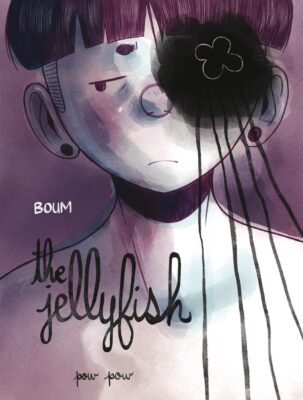In the opening frames of The Jellyfish, a graphic novel by Montreal-based illustrator Boum, Odette sits in a big chair at the optometrist’s office. The twenty-something-year-old is waiting for test results, and you can feel their anxiety on the page; they make themself small as they watch the optometrist type something into his computer, hoping for good news. Finally, he looks up and delivers a diagnosis: Odette has a jellyfish in their left eye. Odette says nothing. Beside them, a small black jellyfish floats through the air.

The Jellyfish
Boum
Translated by Robin Lang and Helge Dascher
Pow Pow Press
$29.95
paper
228pp
9782925114307
What begins as a lighthearted story about a young person with a strange medical issue quickly turns into a nuanced and deeply felt graphic novel about disability and the complexity of relationships. Odette is trying to balance their budding romance with Naina, a young woman they met at the bookstore, with the fact that their vision is rapidly worsening. As a reader, you experience Odette’s vision loss alongside them; as more jellyfish appear, they block out the cleverly drawn panels of the graphic novel, obscuring Odette’s world.
Boum has been part of the Montreal comics scene for well over a decade. Some readers might recognize her from her long-running and award-winning series Boumeries, which features short comics about the artist’s life and family. Though The Jellyfish is a work of fiction, it’s inspired by Boum’s own health issues, with the artist suffering from a number of eye conditions before going blind in one eye in 2021. It was originally published as La méduse in 2022 and translated into English this May by Robin Lang and Helge Dascher.
The Jellyfish is as ambitious as it is beautiful. Boum crafts Odette’s story in stark, black-and-white illustrations and gorgeous page layouts; each panel of the book is expertly plotted, and it all serves to show readers exactly what Odette is going through. Beyond the struggle of coping with a degenerative disability, The Jellyfish also delves into how difficult – and necessary – it can be to lean on others for help. Despite Odette and Naina growing closer, with Naina starting to stay at Odette’s apartment after a falling-out with her father, Odette never tells her about the jellyfish. They keep their worsening vision a secret, worried about becoming a burden on those they love.
The Jellyfish is a treat to read for anyone who lives in Montreal. As the story unfolds, Boum showcases the city with an enormous amount of care and detail. Over and over, Odette climbs up the winding metal staircase to their apartment. They walk down the street with the Olympic Stadium looming in the background. The story takes place over a year, and you experience the city changing around Odette; you watch the leaves fall from the trees and feel the snow on their skin, even when they can’t see it.
It’s a long, difficult, and sometimes heart-breaking process, but by the end of the book Odette starts coming to terms with the fact that their life is now shaped by disability. They learn to navigate the metro with a mobility cane; to feel their way through the kitchen while making coffee; to accept the help that’s offered to them. In short, The Jellyfish is an absolute triumph in terms of both artwork and storytelling.mRb






0 Comments